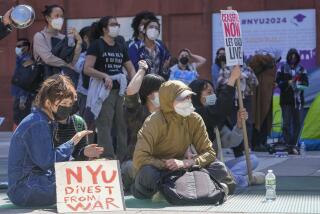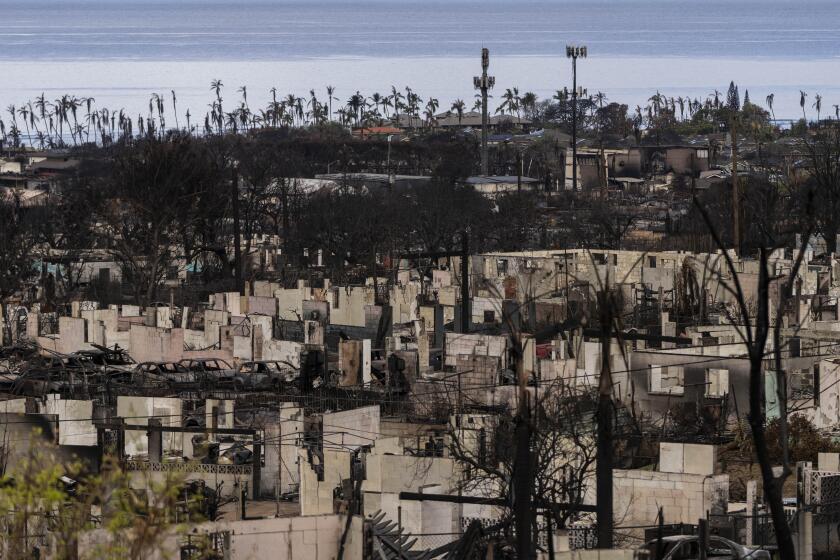U.S. Criticizes Reelection of Cuba to U.N. Human Rights Panel
Cuba won reelection to the U.N. Human Rights Commission on Tuesday despite its recent jailing and executions of political opponents, prompting the U.S. delegation to walk out of the U.N. session in protest.
“It was an outrage for us, because we view Cuba as the worst violator of human rights in this hemisphere,” said Sichan Siv, the U.S. ambassador to the U.N. Economic and Social Council, which elected 24 members for three-year terms on the rights commission.
The White House deplored Cuba’s reelection, noting that it comes just weeks after it imprisoned 75 opposition leaders, including librarians and journalists, and executed three men who tried to hijack a ferry to the United States.
“Cuba doesn’t deserve to be on the Human Rights Commission; it deserves to be investigated by the Human Rights Commission,” said Ari Fleischer, the White House spokesman. “Having Cuba serve again on the Human Rights Commission is like putting Al Capone in charge of bank security.”
The reelection adds fuel to Washington’s fiery criticism of the world organization following the failed U.S. effort to win Security Council support for the war on Iraq. The Bush administration is also still smarting from its loss of the commission seat the U.S. held since 1947. It lost the seat two years ago but regained it last year.
Libya heads the 53-member commission whose members include Sudan, Zimbabwe, Saudi Arabia and the Democratic Republic of Congo, all considered to have poor human rights records.
“The United Nations Human Rights Commission cannot expect to have Libya be its chair, to reelect Cuba, and not have people wonder if they really do stand for human rights,” Fleischer said. But he also said that though “it does raise eyebrows and raise questions about the United Nations Human Rights Commission’s commitment to human rights,” it did not change the U.S. position on the United Nations and its efforts “to do good around the world.”
The root of the commission’s troubles is in the voting system. Some regional groups decide among themselves to nominate only as many candidates as there are allotted seats, as a way to protect regional interests and to reduce competition for the posts. Only if there are more candidates than seats do the other Economic and Social Council members get to vote -- the U.S. lost its seat in such an open vote two years ago.
For Tuesday’s election, Latin America chose Cuba, Costa Rica, the Dominican Republic, Guatemala, Honduras and Peru for the six open seats. Russia, which has come under fire for abuses in Chechnya, also won its seat uncontested.
Human rights groups criticized Latin American and East European countries for not nominating additional candidates and allowing Cuba and Russia to take their seats without opposition.
“This year especially, Cuba’s human rights situation is so much worse, they should have signaled that this time is different,” said Joanna Weschler, the U.N. representative for Human Rights Watch. “They could at least refused them the free ride.”
Critics said that the elections furthered a trend of oppressive governments using their seats to dilute the commission’s efforts to investigate suspected human rights abuses.
“It’s getting worse and worse,” Weschler said. “There should be basic standards for membership. The members should ratify and comply with key human rights treaties, cooperate with U.N. human rights monitors, and not be a target of the commission’s own investigations.”
As the body ended its annual session in Geneva last week, U.N. Secretary General Kofi Annan warned that the members’ divisions were weakening the commission -- and the perception of the U.N.
“This is a time when your mission to promote and protect human rights in the widest sense is more important than ever, your responsibility to act more urgent,” Annan told the commission. “And yet, divisions and disputes in recent months have made your voice not stronger, but weaker; your voice in the great debates about human rights more muffled, not clearer.”
This year, the commission narrowly passed a resolution urging Cuba to accept a visit from a human rights monitor, but failed to approve an amendment criticizing the country’s recent crackdown on dissidents.
In the annual meeting, African and Asian nations, along with Cuba, said that the Western democracies “politicized” their criticism of other countries’ human rights performances, paid more attention to civil and political rights than to economic and development rights, and were trying to impose their own version of democracy on the rest of the world.
More to Read
Start your day right
Sign up for Essential California for news, features and recommendations from the L.A. Times and beyond in your inbox six days a week.
You may occasionally receive promotional content from the Los Angeles Times.






